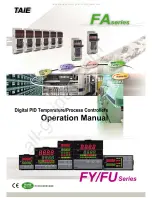
Eaton Corporation
Electrical Sector
1111 Superior Ave.
Cleveland, OH 44114
United States
877-ETN-CARE (877-386-2273)
Eaton.com
© 2011 Eaton Corporation
All Rights Reserved
Publication No. IL165466/ 001
May 2011
Eaton is a registered trademark of Eaton
Corporation.
All other trademarks are property of their
respective owners.
INSTRUCTION LEAFLET
IL15466
Effective May 2011
Instructions for A210, A250 Size 3 or 4 Reversing
Motor Controller
MAINTENANCE - First Turn Off Power
To Inspect Contacts
Refer to Figure 11. Loosen the two arc box assembly screws
(7) located immediately above and below the nameplate and
remove the arc box (8). Contacts (5) are visible. Retighten
the screws per Table V.
To Replace Contacts
After removing the arc box and with replacement contacts at hand,
compress the overt ravel spring (12) and remove the moving contact
(5) from the crossbar (6). Remove the retaining screws (11) and lift
out the stationary contact assembly (14).
To replace contacts, reverse the above procedure, making sure that
stationary contacts are secure, (see Table V) moving contacts are
free to move, overtravel springs are seated and the crossbar moves
freely when the arc box is in position.
The silver cadmium oxide contact buttons need NO dress-
ing or lubricant throughout their life. Important - Replace all
contacts and springs as
a group to avoid misalignment.
To Replace The Coil
Refer to Figure 11. Loosen the assembly screws
(10) located to the immediate left and right of the arc box. Remove
connector straps to the overload relay. Pull the loosened upper base
structure (9) forward. Pull the coil (1) from the upper base, plug in
a new coil, replace the upper base structure and check the auxiliary
contacts for secureness when repositioning the upper base. Tighten
the assembly screws and the connector straps screws referring to
Table V.
Magnet - Armature Assembly
Self alignment and permanent air gap features of the magnet arma-
ture make replacement unnecessary. Mating pole face surfaces
should be kept clean. Arc box must be in place when the contactor
interrupts a circuit.
























